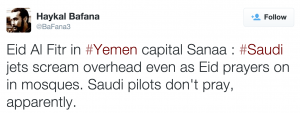Eid Mubarak. Today Ramadan ends, a big celebration in the Muslim community.
Saudi Arabia chose to celebrate by doing what they’ve been doing for over a hundred days: bombing Yemen.
Yet the continued plight of Yemenis — and the expanding humanitarian crisis — has fallen off the media radar.
That’s particularly notable given that according to the formal readouts, every conversation the President has had with Gulf allies about the Iran deal has also included some discussion of Yemen. There’s his conversation with UAE’s Crown Prince, on July 14:
The President spoke today with Crown Prince Mohammed Al Nahyan of Abu Dhabi in the United Arab Emirates. The President shared details of the Joint Comprehensive Plan of Action (JCPOA) regarding Iran’s nuclear program agreed to among the P5+1, the European Union, and Iran. In discussing the details of the JCPOA, the President affirmed that it will verifiably prevent Iran from obtaining a nuclear weapon by cutting off all of the potential pathways to a bomb while ensuring the peaceful nature of Iran’s nuclear program going forward. Recalling the productive discussions with Gulf Cooperation Council (GCC) members at Camp David in May, the President underscored that the United States is as committed as ever to working with our Gulf partners to counter Iran’s destabilizing activities in the region, support our partners in building their defense capabilities, and pursue together efforts to resolve the region’s crises. The President and the Crown Prince also discussed the urgent humanitarian situation in Yemen, the importance of getting assistance to the Yemeni people in all parts of the country, and the need for a political solution that ends the ongoing conflict.
His phone conversation with King Salman, also on July 14:
The President spoke today with King Salman bin Abdulaziz of Saudi Arabia. The President offered his personal condolences over the passing of Prince Saud al-Faisal. He shared details of the Joint Comprehensive Plan of Action (JCPOA) regarding Iran’s nuclear program agreed to among the P5+1, the European Union, and Iran. In discussing the details of the JCPOA, the President affirmed that it will verifiably prevent Iran from obtaining a nuclear weapon by cutting off all of the potential pathways to a bomb while ensuring the peaceful nature of Iran’s nuclear program going forward. The President underscored that the United States is as committed as ever to working with our Gulf partners to counter Iran’s destabilizing activities in the region and promote stability as well as resolutions to the region’s crises. Consistent with the productive discussions the President conducted with Gulf Cooperation Council (GCC) members at Camp David in May, he reiterated the United States’ support in building the capabilities of our regional partners. The President and the King also spoke about the urgency of stopping the fighting in Yemen and the importance of ensuring that assistance can reach Yemenis on all sides of the conflict through international humanitarian channels.
And his face-to-face meeting today with Foreign Minister (and former Ambassador to the US) Adel al-Jubeir:
Today, President Obama met in the Oval Office with Saudi Foreign Minister Adel Al-Jubeir to discuss a range of regional and bilateral issues. They welcomed the Joint Comprehensive Plan of Action (JCPOA) reached between the P5+1, EU and Iran on July 14 which, once fully implemented, will effectively cut off all of Iran’s pathways to a nuclear weapon and verifiably ensure that Iran’s nuclear program is exclusively peaceful going forward. Following on the Camp David meetings with Gulf Cooperation Council leaders, they discussed efforts underway to further enhance the close and long standing partnership between our two countries and build Saudi Arabia’s security capabilities, noting that Secretary of Defense Carter’s visit to Saudi Arabia next week will advance those discussions.
They also reviewed efforts to jointly address and seek to resolve regional crises. They discussed the urgency of stopping the fighting in Yemen and the importance of ensuring that assistance is reaching Yemenis in need through international humanitarian channels without any impediments or delays. They discussed cooperation to reach a genuine political solution in Syria. They also reaffirmed our mutual commitment to reinforce efforts to support Iraq and continue the coalition’s work in the counter-ISIL campaign. The President asked Foreign Minister Al-Jubeir to convey his best wishes to King Salman bin Abdulaziz Al Saud.
The Houthis had started to lose ground (reportedly at the hands of Emirate forces, not Saudi ones) in Aden, but that hasn’t stopped the bombing.
Given the way the Obama Administration has tied some solution to Yemen with the Iran deal, I think it fair to ask whether there has been some kind of understanding that even as Obama pursues this deal, the US will continue to facilitate Saudi Arabia’s efforts to extend its hegemony at the expense of Shias (in Yemen, but also in Syria).
The war in Yemen is America’s war, even if we have no known troops involved. But the US is simply disavowing it — it, and the disaster the war has brought for an already beleaguered people.

